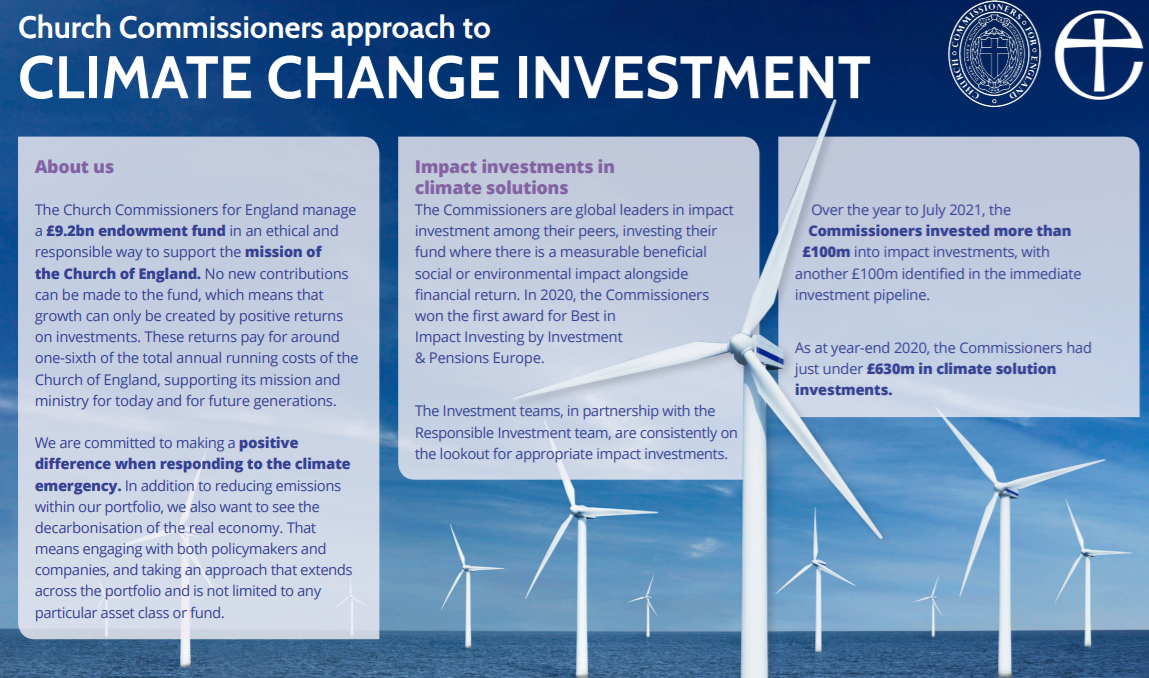 The Church Commissioners have recently published, Church Commissioners approach to climate change investment. which can be read in full here.
The Church Commissioners have recently published, Church Commissioners approach to climate change investment. which can be read in full here.
Revd John Nightingale has written a personal response to the recently published ‘Church Commissioners approach to climate change investment’…
COP26 in Glasgow brought us pictures of people from all over the world calling for climate action. If the temperature of the world is to remain within a 1.5 degrees increase over what it was at the beginning of the industrial revolution, there must be no more exploration for future fuel reserves. That was the conclusion of the International Energy Agency and has resulted in calls for those holding shares in fossil fuel companies to divest (sell their investments) if these companies are not prepared to comply. Current investors include the Church Commissioners and the Pensions Board of the Church of England.
Earlier this month one company, Shell, did decide to withdraw from the prospective Cambo oil field off the Shetlands. I am glad to say their decision was welcomed by Adam Matthews, chief responsible investment officer of the Church of England Pensions Board. "The message is clear to the U.K. Government (that ultimately decide if the field is exploited) that companies beginning to transition will not allocate the capital to such projects," Matthews said in a tweet (Reuters 12 Dec). The Pensions Board carries weight as it is an investor in Shell, and in May 2021 the Church of England Pensions Board backed new Shell energy-transition plan (churchtimes.co.uk)
However, this plan of Shell’s still includes increasing gas production by 20% worldwide in the next few years and involves plans to search out new fossil fuel reserves anywhere in the world for years to come. Most of those fossil fuel reserves are outside the UK. One notable example is Shell’s engagement in seismic drilling off the coast of South Africa. In response more than 300,000 people have signed a petition calling for an end to the seismic drilling. In September 2021, more than 20 Anglican Bishops Call for an Immediate halt to Gas and Oil Exploration in Africa – Green Anglicans. The bishops are from Mozambique, Namibia, Saint Helena, Lesotho and South Africa. In Malawi also concern has been expressed by church leaders about the government decision to exploit oil from Lake Malawi, according to Charles Bakolo, the Provincial Environmental Coordinator for the Province of Central Africa.
What are the implications for the Church of England of this call from our fellow Anglicans for “the immediate cessation of fossil fuel exploration across Africa” and “the application of effective climate justice so that countries of Africa, disproportionately affected by climate change, may be enabled to leapfrog the polluting fossil fuel era into the clean renewable energy era”? Should clergy pensions like mine retain such investments? Should dioceses like Birmingham continue to hold them? Are there investment opportunities in forms of energy better for the environment or in retrofit home insulation? Many other British churches have made a decision to divest, most notably a few months ago the Roman Catholic Archdiocese of Birmingham, and Archbishop Desmond Tutu has for some years been asking the Church of England to do so. And how can the churches most effectively influence the investing community? These may well be questions raised at the Lambeth Conference scheduled for 2022.
It took decades for the restriction, and then abolition, of slavery to be spread from Britain to all parts of its empire. I hope that, in the case of stopping fossil fuel exploration, it will not take that long.
Revd John Nightingale
19 December 2021